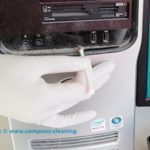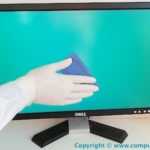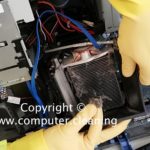Nursing and residential homes present some challenges to effective outbreak-associated cleaning because of the necessity for a homely environment. They do have carpeted floors and soft furnishings. Consideration should be given at the point of purchase to the ability to successfully clean and decontaminate such items. Penetrative cleaning methods such as steam should be used during outbreaks and in terminal cleaning schedules.
Lavatories and bathrooms are similarly more homely. The importance of regular, frequent cleaning of such areas (even when not shared) should be stressed. The same cleaning materials and principles that apply to hospitals also apply to care homes.
1. Routine Cleaning
Routine, enhanced and terminal cleaning needs to be undertaken by staff who are specifically trained for the tasks. The use of contracted cleaners will need to be covered by appropriate terms within the contract that ensure the competent cleaning of the environment during and at the end of an outbreak and contract monitoring arrangements should be included.
Cleaning equipment and materials for lavatory and bathroom areas should be kept separate from those used in other, especially catering, areas both routinely and during outbreaks.
Particular attention will need to be given to care workers who may have multiple roles which may compromise adequate IPC, both during an outbreak and at other times. In particular, care workers may be expected to help with the feeding of residents as well as clean the environment, including lavatory areas. Meticulous application of IPC principles, including handwashing with soap and water, must be ensured through appropriate training and audit.
2. Handwashing facilities
The use of tablets of soap is often valued by residents. These may be allowed but should not be shared. Only liquid soap should be used in communal areas.
Handwashing by staff must occur before and after caregiving procedures. The use of residents’ handwashing facilities is acceptable. However, all staff should use only liquid soap and paper towels for handwashing.
The use of alcohol hand rub preparations by staff in nursing and residential homes should be considered as part of a general IPC approach (norovirus is not fully susceptible to alcohol) but this will require a risk assessment by the home manager to ensure the safety of residents.
3. Computers, Laptops, and Keyboards
Remove gloves and clean hands before touching a computer keyboard or laptop after giving clinical care. If a laptop or computer not used in conjunction with clinical care, wipe laptop with computer cleaning wipes weekly and if visibly soiled if you are sole user. If you are hot desking, wipe computer daily as you log on. – Wipe with sanitising wipe (e.g. Clinell) if visibly soiled and daily (if taken into homes) taking care, not to over wet electrical equipment. If not taken into homes and visibly clean wipe weekly.
Use a waterproof wipeable keyboard/or silicone skin that will tolerate a chlorine-based disinfectant and clean with sanitising wipe after each patient. If soiled with visible blood decontaminate with a chlorine-based disinfectant (1000ppm av chlorine)
4. Laundry
The new guidance in preparation by the Department of Health, HTM 01-04 (42), also applies to the handling of laundry in care homes and these must be referred to.
All linen should be handled with care and attention paid to the potential spread of infection. Personal protective equipment (PPE) such as plastic aprons and suitable gloves should be worn for handling contaminated clothing and linen. Linen should be removed from a resident’s bed with care, and placed in an appropriate bag.
Personal clothing should also be removed with care and placed in the bag, not placed upon the floor. Linen and another laundry should not be held close to the chest to prevent contamination of the uniform (an apron should be worn).
Any segregation required prior to washing should be carried out before transport to the laundry area, negating the need for additional handling within the laundry. Staff should never empty bags of linen onto the floor to sort the linen into categories – this presents an unnecessary risk of infection. Many care homes currently use water-soluble bags within cotton sacks in a wheeled trolley to facilitate this separation, keeping linen off the floor before taking the bags to the laundry.
The laundry staff should never open any inner water-soluble bags. Instead, the bags should be transferred to the washing machine for decontamination.
After handling linen, hands should be washed thoroughly as per the guidance found elsewhere in this document.
If linen is sent to an off-site laundry, the laundry should be made aware of its nature and written guidelines should be agreed and followed regarding its transportation and handling. The care home manager and laundry staff should be satisfied that the laundering of items sent will meet the necessary decontamination requirements.
5. Visitors
As is the case for hospitals, it is important to balance the rights and needs of residents to have visitors with the duty of care to other residents and visitors. It is important that symptomatic visitors should be discouraged from visiting until 48h symptom-free. Asymptomatic visitors of both symptomatic and asymptomatic residents should be advised that they may be exposed to infection. However, the hospital practice of high-visibility notices and other warning devices may be less applicable to nursing and residential homes because, again, such an approach detracts from a homely environment. If it is felt to be too intrusive to have noticed, then alternative methods of effective communication, such as speaking with visitors on arrival and providing information sheets or leaflets must be substituted. To fail to alert any visitor to the risk of infection would be unacceptable.
Children of school age and non-essential visitors should be discouraged from visiting in the same way as for hospitals.
Terminally ill residents, vulnerable adults and those for whom visiting is an essential part of recovery should be allowed visitors at the discretion of the home manager. Clinical and social justice needs to be applied sensitively and compassionately whilst recognising the duty of care for the health and well being of all residents, staff and visitors. Those who have travelled a long distance, taken time off work, or in other ways have been significantly inconvenienced, should be allowed to visit residents on outbreak restricted areas. Visits to multiple residents (e.g. by ministers of religion) should be planned so that those under isolation are visited last.
6. Staff considerations
Staff who become ill at work should be excluded immediately. Symptomatic staff should be excluded until recovered and they have been symptom-free for 48h.
One study has suggested that whether norovirus-infected staff in care homes are excluded for 48h or 72h has no effect on the mean number of cases or the attack rate in residents although the former period may be associated with increased cases among staff (43).
The Working Party believes that a 48h exclusion period is pragmatic.
7. Prevention of hospital admissions
The admission of residents with norovirus to the hospital can lead to severe disruption of services. Wherever possible, symptomatic residents should be managed in the home and hospital admission should only be contemplated for those who are at serious risk of complications. Rehydration strategies should be employed and these should usually suffice. In the event of a referral to the hospital, the hospital should be informed of the possibility of norovirus in the resident before the transfer occurs. The ambulance crew who transport the resident should also be informed.
8. Residents discharged from hospital
Residents who have been affected by norovirus whilst in the hospital can be discharged to nursing or residential homes when they have recovered and have been symptom-free for 48h.
Residents who have been exposed to norovirus whilst in hospital but who have not developed symptoms may be discharged to nursing or residential homes only on the advice of the local health protection organisation who will liaise with the hospital IPCT.
In the event that a resident is discharged within the 48h period after cessation of symptoms, or if they may be within the incubation period following exposure to a case, efforts should be made to accommodate them, if possible, within a single room with a dedicated toilet and appropriate precautions until significant risk of norovirus has passed.





